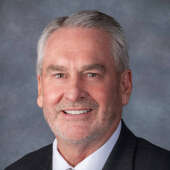- Balancing Nebraska's three-legged stool (7/19/24)
- Taking on the high cost of education (7/15/24)
- Clearing up misconceptions of LB 1402 (5/10/24)
- The short session has ended, but the work is not over (5/1/24)
- In the upcoming election, values matter (4/23/24)
- Every child deserves an opportunity (2/2/24)
- Jan. 16 is Religious Freedom Day (1/9/24)
Opinion
Help for healthcare providers
Friday, March 4, 2022
One thing that COVID-19 has highlighted is a shortage of medical personnel in rural Nebraska. The number of COVID patients put a strain on an already burdened healthcare workforce. I have introduced legislation this session to try and combat this shortage.
LB 1269 is intended to appropriate $10 million to the Department of Health and Human Services (DHHS) from funds allocated pursuant to the American Rescue Plan Act (ARPA) for FY2022-2023. These funds are meant for the repayment of qualified educational debts owed by eligible health professionals under the Rural Health Systems and Professional Incentive Act (Act). This is not a new program or “ask”; rather, it is an effective, existing program that can easily be bolstered by ARPA funds.
This Act contains the governing statutes for the rural health professional student loan repayment program housed at DHHS. Basically, the program provides funds for student loan repayment to health professionals who commit to practice in rural health shortage areas. There is a practice commitment of 3-4 years for these professionals. If they break this commitment, they are required to pay back the funds they borrowed. The program is open to physicians, physician assistants, nurse practitioners, dentists, pharmacists, occupational therapists, physical therapists, psychologists, and other mental health practitioners, and has been very successful in meeting rural healthcare needs.
The last several years have seen a waitlist for this program, which means we weren’t fully maximizing our options to send more health professionals to rural areas to address access issues, even though the demand was there. The legislature increased funding to the program in last year’s budget, but those funds are dwindling quickly through current program participation. Thus, this request is appropriate from what could reasonably be obligated and spent under this program by the 2026 deadline.
A companion bill I introduced earlier in the session, LB 1007, is to further maximize this important program by making clear in statute that if federal law does not require a local match requirement, the state also not require a local match.
Currently, the program requires this local match as a way for communities to have “skin in the game” in partnership with the state. The ability of the local clinic or community to produce enough local matching funds is often the biggest hinderance to increasing available health professional positions that qualify for the program. However, due to the pandemic, the federal Health Resource Services Administration will be sending funds to the state for this program that waives the local match requirement. Pair these funds with ARPA funds, which also do not require a local match, and we have the opportunity to vastly increase the number of health professionals serving in rural shortage areas.
Currently, it is my understanding that there are approximately 200 providers in the program. This funding would accommodate approximately 1,000 additional providers, making a huge, immediate impact in rural health care now. This is a sector that was greatly impacted by the pandemic, and one that my constituents and fellow Nebraskans must rely on to live their lives. I am hoping this is something we can get done this year so that we may take full advantage of these federal funds.
Additionally, this session, Senator Robert Hilkemann of Omaha introduced LB 721, a bill to appropriate funds for the University of Nebraska Medical Center Rural Health Complex. LB 721 appropriates $60 million in federal funds to the University of Nebraska for the establishment of a facility for the University of
Nebraska Medical Center Rural Health Complex located on the campus of the University of Nebraska at Kearney. The $60 million would be appropriated from ARPA funds as well. I added my name as a co-sponsor of this bill and fully support it. I believe it is an additional way to bolster rural healthcare.
I welcome any comments, questions, or ideas you may have on this or any other issue. Please feel free to email me at dmurman@leg.ne.gov or call my office at 402-471-2732.

